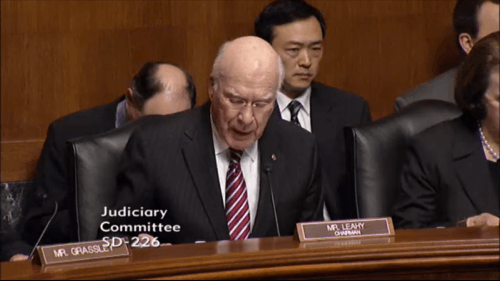
Legislators have introduced bipartisan bills in both chambers of Congress to reaffirm consumers’ right to unlock their smartphones once they’re off contract. But the bills stop well short of any serious, permanent change.
The Senate version of the legislation is S. 517, the Unlocking Consumer Choice and Wireless Competition Act, which was introduced March 11 by Sens. Patrick Leahy (D-VT) and Al Franken (D-MN), along with Sens. Chuck Grassley (R-IA), Orrin Hatch (R-UT), Michael Lee (R-UT) and Amy Klobuchar (D-MN), all members of the Senate Judiciary Committee.
The provenance of the bill is important, as the involvement of so many Judiciary Committee members means the bill is much more likely to actually get a vote on the Senate floor. The bipartisan (yes, it’s still a real word) backing should help grease the wheels as well.
The bill is also very short, as bills go — just 289 words. That’s both good, in that there won’t be much to argue about, and bad, because the bill won’t actually do all that much. Here’s how it breaks down:
- Section 2(a) repeals the specific interpretation of the Digital Millennium Copyright Act (DMCA) made by the Librarian of Congress on October 28, 2012. That ruling let an exemption that permitted consumers to unlock their phones without legal retribution expire on January 26, 2013.
- Section 2(b) of the bill, though, sets a one-year limit on the repeal of the cell-phone unlocking exemption. So assuming this measure gets passed, one year later the Librarian of Congress would again be free to let the unlocking exemption expire, thus bringing us right back to… where we are today.
- Section 2(c) emphasizes that nothing in the law usurps the overall authority of the Librarian of Congress.
That’s the whole thing, in just 182 words less than the actual bill.
The issue at hand is really the Digital Millennium Copyright Act, the 1998 law that Leahy helped create. This sweeping copyright protection law criminalized any efforts to bypass copyright protections and device access control. And buried within it is the authority given to the Librarian of Congress to periodically review new and existing technologies to make sure the DMCA is properly applied.
The Librarian’s 2012 DMCA review allowed the unlocking exemption to expire, which in turn inspired a White House petition calling for the its reversal. The petition seemed to resonate, and received 14,000 more signatures than the 100,000 required to get an official response.
(See also: The White House Agrees: Unlocking Your Cellphone Should Be Legal)
Instead of a classic carefully worded response, the White House offered a blast at the Librarian’s interpretation of the DMCA rule. U.S. carrier AT&T then responded that it never had any problems with customers unlocking cell phones, just so long as no one broke any contracts.
The White House’s explicit call for unlocking legislation means this bill has a good chance to be a law. Plus, in the House of Representatives, House Judiciary Committee Chairman Bob Goodlatte (R-VA) and Ranking Member John Conyers (D-MI) are also backing similar legislation.
(Check out: AT&T: You Can Unlock Your Cellphone, Really)
There is a chance, albeit a small one, that a one-year extension of cell phone unlocking will give the Librarian pause the next time the DMCA review rolls around. But it’s hard to buy that this bill is anything but political theater, a quick spoonful of pablum to make voters happy for a while and perhaps dispel the perception of Congress as something than hyper-polarized.
Good luck with that. The fact that no one seems opposed to cell phone unlocking, even the carriers that could stand to lose a little business if a customer takes their device elsewhere once a contract is done, is likely why Congress is all gung-ho on these bills. No lobbying? No problem.
There is also an inherent problem with all of this unlocking discussion: many users won’t care about unlocking. When their contract runs out, consumers are usually craving the latest new and shiny devices on the market. Even if they are looking to switch carriers, the thought of getting a new phone is compelling enough they won’t even bother with trying to take their old phone with them.
Unlocking will be great for those users who need it, but thanks to the power of marketing, holding on to phones for as long as you can seems to be a bygone practice.








